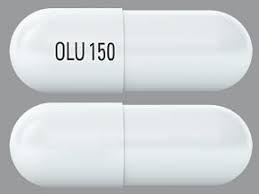Rezlidhia Side Effects
Generic name: olutasidenib
Medically reviewed by Drugs.com. Last updated on Jan 10, 2025.
Note: This document provides detailed information about Rezlidhia Side Effects associated with olutasidenib. Some dosage forms listed on this page may not apply specifically to the brand name Rezlidhia.
Applies to olutasidenib: oral capsule.
Important warnings
This medicine can cause some serious health issues
Oral route (capsule)
Warning: Differentiation Syndrome. Differentiation syndrome, which can be fatal, can occur with olutasidenib treatment.
Symptoms may include dyspnea, pulmonary infiltrates/pleuropericardial effusion, kidney injury, hypotension, fever, and weight gain.If differentiation syndrome is suspected, withhold olutasidenib and initiate treatment with corticosteroids and hemodynamic monitoring until symptom resolution
Precautions
It is very important that your doctor check your progress at regular visits to make sure this medicine is working properly. Blood tests may be needed to check for unwanted effects.
Using this medicine may increase your risk of having a condition called differentiation syndrome, which may be life-threatening. It may occur as early as 1 day and up to 18 months after starting this medicine. Check with your doctor right away if you start to have a chills, cough, dizziness or lightheadedness, eye pain, fever, general feeling of illness, headache, rapid weight gain, sore throat, swelling in the arms or legs, trouble breathing, unusual tiredness. Your doctor may give you a steroid medicine (eg, dexamethasone) to help treat these symptoms.
Check with your doctor right away if you have dark urine, fatigue, loss of appetite, nausea or vomiting, stomach pain, or yellow eyes or skin. These may be symptoms of a serious liver problem.
Do not take other medicines unless they have been discussed with your doctor. This includes prescription or nonprescription (over-the-counter [OTC]) medicines and herbal or vitamin supplements.
Serious side effects of Rezlidhia
Along with its needed effects, olutasidenib (the active ingredient contained in Rezlidhia) may cause some unwanted effects. Although not all of these side effects may occur, if they do occur they may need medical attention.
Check with your doctor immediately if any of the following side effects occur while taking olutasidenib:
More common side effects
- agitation
- bloody stools
- blue lips, fingernails, or skin
- blurred vision
- chest pain or tightness
- chills
- coma
- confusion
- cough
- decreased urine output
- depression
- dizziness
- eye pain
- fever
- general feeling of illness
- headache
- hostility
- irregular, fast or slow, or shallow breathing
- irritability
- lethargy
- muscle twitching
- nausea
- pounding in the ears
- rapid weight gain
- rectal bleeding
- seizures
- slow or fast heartbeat
- sore throat
- stomach pain or tenderness
- stupor
- swelling of the face, ankles, or hands
- trouble breathing
- unusual tiredness or weakness
Incidence not known
- dark urine
- loss of appetite
- stomach pain, sever
- vomiting
- yellow eyes or skin
Other side effects of Rezlidhia
Some side effects of olutasidenib may occur that usually do not need medical attention. These side effects may go away during treatment as your body adjusts to the medicine. Also, your health care professional may be able to tell you about ways to prevent or reduce some of these side effects.
Check with your health care professional if any of the following side effects continue or are bothersome or if you have any questions about them:
More common side effects
- bleeding gums
- body aches or pain
- bone pain
- constipation
- diarrhea
- difficulty in moving
- hoarseness
- irritation in the mouth
- joint pain
- mouth ulcers
- muscle pain or stiffness
- pain in the arms or legs
- redness and swelling of the gums
- stuffy or runny nose
- tender, swollen glands in the neck
- trouble in swallowing
- voice changes
See also:
For healthcare professionals
Applies to olutasidenib: oral capsule.
General adverse events
The most common (20% or greater frequency) adverse reactions, including laboratory abnormalities, were aspartate aminotransferase increased, alanine aminotransferase increased, potassium decreased, sodium decreased, alkaline phosphatase increased, nausea, creatinine increased, fatigue/malaise, arthralgia, constipation, lymphocytes increased, bilirubin increased, leukocytosis, uric acid increased, dyspnea, pyrexia, rash, lipase increased, mucositis, diarrhea and transaminitis.
Serious adverse reactions were reported in 25% of patients which included differentiation syndrome (9%) and transaminitis (6%).
Adverse reactions that led to permanent discontinuation of this drug were reported in 8% of patients which included transaminitis, differentiation syndrome, and gallbladder disorders.[Ref]
Dermatologic
- Very common (10% or more): Rash (24%)[Ref]
Gastrointestinal
- Very common (10% or more): Abdominal pain (18%), constipation (26%), diarrhea (20%), mucositis (23%), nausea (38%), vomiting (17%)[Ref]
Cardiovascular
- Frequency not reported: Electrocardiogram QT prolongation[Ref]
Hematologic
- Very common (10% or more): Differentiation syndrome (16%), hypertension (10%), leukocytosis (25%)[Ref]
Hepatic
- Very common (10% or more): Transaminitis (20%)
- Frequency not reported: Biliary tract disorder, biliary colic, cholangitis, and cholestasis[Ref]
Metabolic
- Very common (10% or more): Decreased appetite (16%)[Ref]
Musculoskeletal
- Very common (10% or more): Arthralgia (28%)[Ref]
Nervous system
- Very common (10% or more): Headache (13%)[Ref]
Other
- Very common (10% or more): Edema (18%), fatigue/malaise (36%), pyrexia (24%)[Ref]
Respiratory
- Very common (10% or more): Cough (17%), dyspnea (24%)[Ref]
References
1. (2022) "Product Information. Rezlidhia (olutasidenib)." Rigel Pharmaceuticals
More about Rezlidhia (olutasidenib)
- Check interactions
- Compare alternatives
- Pricing & coupons
- Drug images
- Dosage information
- During pregnancy
- FDA approval history
- Drug class: miscellaneous antineoplastics
- Breastfeeding
- En español
Patient resources
Professional resources
Related treatment guides
Further information
Rezlidhia side effects can vary depending on the individual. Always consult your healthcare provider to ensure the information displayed on this page applies to your personal circumstances.
Note: Medication side effects may be underreported. If you are experiencing side effects that are not listed, submit a report to the FDA by following this guide.

